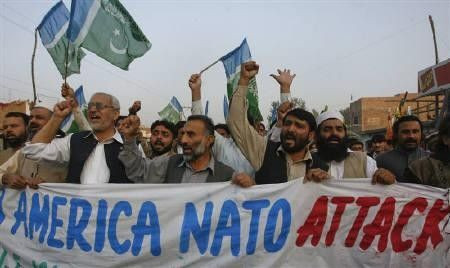U.S.-Pakistani Co-Dependence May Prevent Rupture

Pakistan and the United States may be a little too dependent on each other to allow the death of two dozen Pakistani soldiers, in airstrikes by NATO forces on Saturday, to cause a definitive rupture.
However, the incident, which is the latest in a series of embarrassments to bedevil the relationship between the two countries, will aggravate the level of mistrust between them. It will also require quick diplomatic work to be contained.
According to analysts who track the relationship, a speedy and thorough investigation to inquire into the events, establish responsibility and make amends is vital, although any reconciliation may be harder to achieve if NATO forces conclude the Pakistanis started the fight.
They still have a great deal of co-dependence, said Shuja Nawaz, an authority on the Pakistani military, at the Atlantic Council think tank in Washington, The United States needs Pakistan until it wraps up kinetic operations in Afghanistan. The United States plans to have most troops out of Afghanistan by the end of 2014.
While details of the latest incident are still sketchy, it is known that NATO helicopters and fighter jets based in Afghanistan attacked two Pakistani military outposts, in what Islamabad called an unprovoked assault.
However, on Sunday, a senior Afghan security official said that NATO and Afghan forces came under fire from across the border, before NATO aircraft attacked.
Extremely Murky
An early test of the damage to the U.S.-Pakistan relationship may come from how well the sides cooperate with each other and the Afghan authorities, in future investigations.
The key questions include who fired first and from where; why NATO and Pakistani forces appear to have been unable to communicate so as to prevent the Pakistani deaths; and whether NATO helicopters knew they had entered Pakistani territory.
All of this is extremely murky and needs to be investigated, said an Obama administration official, who spoke on condition of anonymity.
Our goal today is ... that the investigation gets mounted in a way that is confidence-building on all sides, the official added.
Pakistan shut down NATO supply routes into Afghanistan - used to send in nearly half of the alliance's land shipments - in retaliation to an attack it described as the worst since the country allied itself with the U.S. Islamabad also said it would ask U.S. personnel to vacate a Pakistani base used to launch drone attacks, a threat it has made before without following through.
The attack was the latest perceived provocation by the United States, which earlier infuriated Pakistan's powerful military with a unilateral U.S. special forces raid that killed al Qaida leader, Osama bin Laden, in May.
That raid also cost Pakistan much goodwill among U.S. politicians who questioned why the United States provided so much military and economic assistance to a country where bin Laden lived with impunity. Many Republican presidential candidates have asked the same question.
According to a U.S. Congressional Research Service tally released this year, the United States set aside some $22.01 billion in aid for Pakistan over the last decade, of which $14.62 billion was security-related and the rest economic.
Other alliance-straining events over the past 15 months included a Sept. 30, 2010 incident in which NATO forces killed two Pakistani service personnel, leading Pakistan to cut off NATO's vital ground supply route for 10 days.
On Jan. 27, a CIA contractor killed two Pakistani men he said were trying to rob him in Lahore, undermining ties between the U.S. and Pakistani intelligence services.
Finally, in September, a former top U.S. military officer accused Pakistani intelligence organizations of backing violence against U.S. targets, including a Sept. 13 attack on the U.S. embassy in Kabul.
Last Straw?
Admiral Michael Mullen, the Chairman of the U.S. Joint Chiefs of Staff, described Pakistan's Inter-Services Intelligence (ISI) agency as one supporting the Haqqani network (of known militants), which he also described as a veritable arm of the ISI.
Is this the last straw? (I) hope not. I believe both governments also hope not, said retired Ambassador Teresita Schaffer, a fellow at the Brookings Institution, who served as a U.S. diplomat in Pakistan, India, Bangladesh and Sri Lanka.
While there have been suggestions Pakistan could seek to improve its ties to China as a strategic counterweight to the United States, analysts dismissed this idea. Islamabad receives significant amounts of military hardware from Beijing and their armed forces are close but Schaffer said the United States is a source of two things Beijing does not provide: top-flight weaponry and extensive cash assistance. However, even if there is no radical rupture, relations are unlikely to improve quickly.
The U.S.-Pakistan relationship appears destined to lurch from crisis to crisis unless and until the two sides can reach some kind of understanding on the way forward in Afghanistan, said Lisa Curtis of the Heritage Foundation think tank.
The situation will not be helped by the fact that NATO is planning to intensify operations in eastern Afghanistan next year, to try and cut off insurgent routes from Pakistan.
© Copyright Thomson Reuters 2024. All rights reserved.





















